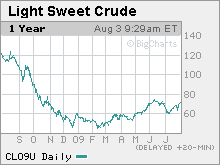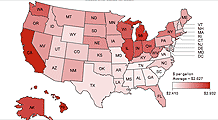Oil: Speculating on higher prices
News from China and Washington could send the price of crude higher down the road.

| MMA | 0.69% |
| $10K MMA | 0.42% |
| 6 month CD | 0.94% |
| 1 yr CD | 1.49% |
| 5 yr CD | 1.93% |
NEW YORK (Fortune) -- Oil prices hit their highest level in a month Monday on hopes that the U.S. economy was finally on the road to recovery. Still, that recovery is taking a lot longer than oil traders had hoped. Prices are nowhere near their all-time high of $147 a barrel a year ago.
Longer-term, what does this continued softness at home mean for the direction of prices? Our guess is less than you'd think.
It's been some time since U.S. demand was the primary driver of global oil prices.
Between 2000 and 2008, U.S. oil consumption actually declined 1.5%. What drove oil prices ever higher was skyrocketing energy demand from developing nations such as China and India.
Oil consumption rose 64% and 38% respectively, in those countries from 2000 to 2008. So when the global recession took a whack out of the emerging markets -- at one point the International Energy Agency was predicting oil consumption in China would actually decline in 2009 -- oil prices plummeted.
That's why the latest news out of China bodes well for oil investors (and bodes ill for gas-price-weary consumers). Chinese oil consumption increased 5.2% in the second quarter of 2009, a significant turnaround from the first quarter when consumption there fell 3.1%, according to Barclays Capital. Barclays now expects oil, which has since rebounded to about $72 a barrel, to reach $85 next year. Barclays also predicts a 70% increase in U.S. natural gas prices.
Another bullish indicator, believe it or not, is Washington's obsession with oil futures trading. If Congress or the CFTC forces through stiff curbs on futures trading by so-called "speculators" -- i.e. investors who use futures to bet on future price movements but don't buy actual oil -- it may lead to higher, not lower, oil prices over the long term.
Why? Imagine you're an oil company CEO thinking about drilling a new oil well that won't produce until 2011. Given the high upfront costs of drilling, you're going to be more likely to undertake the project if you can use the futures market to lock in oil prices in 2011 that will justify your drilling costs. The buyer on the other end of your futures trade is probably an investor -- someone who will commit to paying you $75 a barrel for oil in 2011 because he believes actual price in 2011 will be even higher.
However, if fewer investors are allowed to take the other side of your trade, you will have a harder time locking in a good price for your 2011 oil. That could make it harder for you to justify the upfront cost of building the new well. Less investment in new oil wells means less future supply, and less supply means higher oil prices.
"It depends on what they do," Tim Rochford, chairman of Oklahoma oil company Arena Resources, says about curbs that Congress or the CFTC could slap on speculators. "If it were a drastic move, I don't think there's any question it could interfere with small and mid-size companies' ability to hedge and therefore interfere with future development or capital expenditures."
One way to play all this would be simply by buying an exchange traded fund that tracks the price of oil, such as United States Oil Fund (USO). Keep in mind, however, that these funds typically invest in oil futures, which means their operations could be affected by any crackdown on oil speculation.
A more traditional oil play is Chevron (CVX, Fortune 500), which is down 9% this year. Currently $69 a share, Chevron boasts a 3.9% dividend yield, and given the company's expected production growth, it is well positioned to benefit from a rise in oil prices, according to a report by JP Morgan oil analyst Michael LaMotte. LaMotte's price target for Chevron: $85 a share. ![]()
-
 The retail giant tops the Fortune 500 for the second year in a row. Who else made the list? More
The retail giant tops the Fortune 500 for the second year in a row. Who else made the list? More -
 This group of companies is all about social networking to connect with their customers. More
This group of companies is all about social networking to connect with their customers. More -
 The fight over the cholesterol medication is keeping a generic version from hitting the market. More
The fight over the cholesterol medication is keeping a generic version from hitting the market. More -
 Bin Laden may be dead, but the terrorist group he led doesn't need his money. More
Bin Laden may be dead, but the terrorist group he led doesn't need his money. More -
 U.S. real estate might be a mess, but in other parts of the world, home prices are jumping. More
U.S. real estate might be a mess, but in other parts of the world, home prices are jumping. More -
 Libya's output is a fraction of global production, but it's crucial to the nation's economy. More
Libya's output is a fraction of global production, but it's crucial to the nation's economy. More -
 Once rates start to rise, things could get ugly fast for our neighbors to the north. More
Once rates start to rise, things could get ugly fast for our neighbors to the north. More








